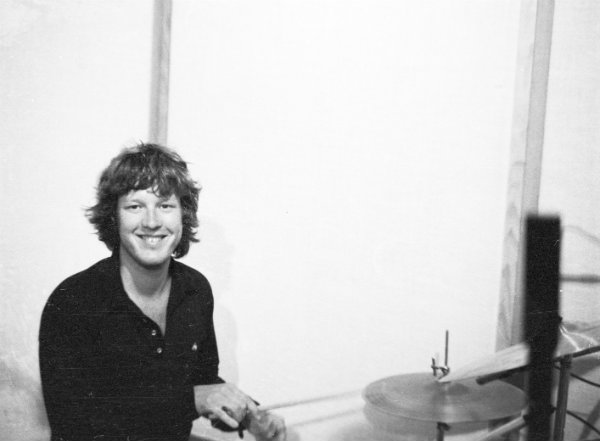
Talking Heads’ Chris Frantz | Courtesy St. Martin’s Press
There’s a refreshing optimism to Chris Frantz’s new memoir “Remain in Love,” a positivity that beams through its pages as the drummer recounts, with some amazement, career highlights like touring with the Ramones, befriending the B-52’s and playing thrilling concerts with the big-band version of Talking Heads — and most of all, sharing all that with the love of his life, Tina Weymouth.
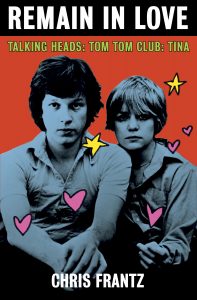 Frantz, co-founder of Talking Heads and Tom Tom Club, tells Slicing Up Eyeballs in a new interview that he didn’t want to turn the biography — which is out Tuesday via publisher St. Martin’s Press — into “a ‘whiny drummer rails against famous lead singer’ type of book.”
Frantz, co-founder of Talking Heads and Tom Tom Club, tells Slicing Up Eyeballs in a new interview that he didn’t want to turn the biography — which is out Tuesday via publisher St. Martin’s Press — into “a ‘whiny drummer rails against famous lead singer’ type of book.”
And while readers will find Frantz taking more than a few shots at David Byrne, with whom he and Weymouth long have made known their differences, he succeeds in not overwhelming his own story with grievance. In fact much of the book focuses on the earlier years, up through “Stop Making Sense” — before the band became, as Frantz says in this interview, “The David Byrne Show.”
Rather, the drummer’s story is suffused with love, as he lays out early in the memoir — and is referenced directly in the title.
“Sometimes people ask me if it is hard to play music and tour with my wife,” Frantz writes. “I tell them that I’ve never known any other way and I love it. I really do. It takes kindness, patience and a good sense of humor. But most of all, it takes a willingness to accept and return love. Every man should be so lucky.”
Below, read Slicing Up Eyeballs’ full interview with Frantz, in which he discusses his musical relationship with Weymouth, the chemistry of Talking Heads, the band’s falling out with Brian Eno, the birth and necessity of Tom Tom Club, and the band’s oft-neglected later years, including its swan song Naked.
The following has been edited for length and clarity.
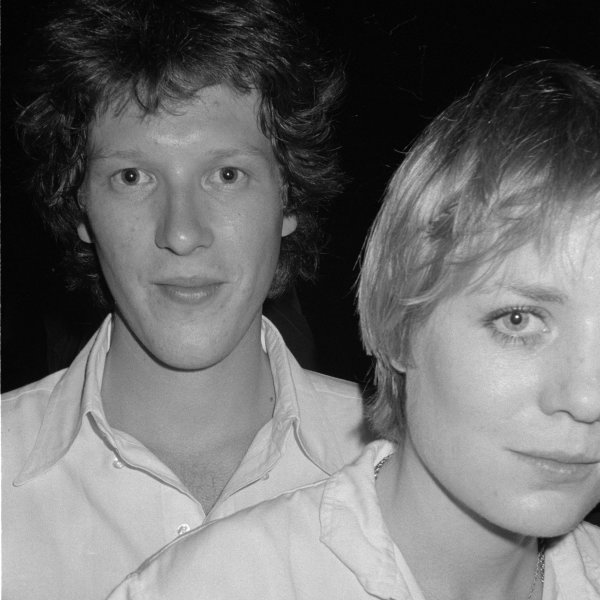
Chris Frantz and Tina Weymouth | Courtesy St. Martin’s Press
Q: I wanted to start by asking about the book’s title. Reading it, it was clearly as much your own personal history as a love letter to Tina and the music you made together.
A: Yeah.
Q: Was that the intention going in, or did you find as you were writing that the theme just sort of emerged?
A: I’m pretty sure that was my intention going in. I’d been thinking about doing this book for like 12 years, I think. And then I finally got serious a couple years ago and, you know, I Had to try to consider a lot of things before I even got started, such as what’s the tone of this book going to be. And I wanted the tone to be serious, but I also wanted to convey the sense of fun that we had, that I experienced with Talking Heads and the love that I have for Tina, which remains very strong. You know, we had that big hit album, actually it wasn’t a hit at first, but we had an album that was taken very well by the critics — Remain in Light — and I was thinking, “What should I call this book? What should I call this book?” And I thought of several different things, but, again, I didn’t want it in any way to be perceived as mean-spirited, like a “whiny drummer rails against famous lead singer” type of book. So I thought, oh, I can call it “Remain in Love.” And you know, I’m very happy with that title. So glad I thought of it.
Q: In the beginning of the book you spend a lot of time really trying to convince Tina, and then waiting for her to finally agree, to join the band. And then when she does walk in the door with that bass, you were so excited. What was it that you saw in her musically that maybe she didn’t see?
A: I just saw the potential for a really great collaborator, and also a person who would look cool. And that’s important, especially in a band that was not known for looking cool. I knew early on. I asked Tina to be in our first band, The Artistics, back when we were still at the Rhode Island School of Design, and she declined. She very politely declined. Said, “Oh no, I don’t think that’s a good idea.” But the reason I asked her is I felt she shared an artistic aesthetic that I also shared with David, which was an aesthetic that has its basis in the arts and not just popular culture. Popular culture was very important to us, too, but perhaps even more important was this thing we were trained to do at RISD, which is to be unique unto ourselves. When you create something, it’s OK to emulate other artists that came before you, but make sure you give your audience something that’s unique unto yourself. So that was very important to us, that the person share that idea, not just be another clone of David Bowie or Mick Jagger. And I also knew that Tina had a very good sense of rhythm because when we first started dating, and even still, we liked to dance together. She was the best dancer I’ve ever danced with I could tell she really had a good sense of rhythm and was really feeling the music. I knew that she played some music, acoustic guitar, and could read some music — and that was really more than I could do, or David. So I thought we should recruit her into the band. I tried and tried and tried, and then finally, after Tina and David and I moved to New York and we were sharing this loft on the Lower East Side, three blocks from CBGB’s, she should hear David and I trying to work out parks and trying to create interesting music beds for his lyrics. And I think she saw that, ‘Oh, I could really add something to this,’ and she did, in a big way. In my way of thinking, Tina was not just a musical contributor to our band, but also a person who helped define the direction we were going to go in.
Q: Over the years of playing with Tina, being a rhythm section together, do you think the fact that you two were in love with each other, later married, did that somehow add to your ability to play together, to be in sync?
A: It probably did. Certain things just come together by osmosis, by being in close proximity with one another, and by living together. So I think, yes, our musical relationship benefited from our personal relationship.
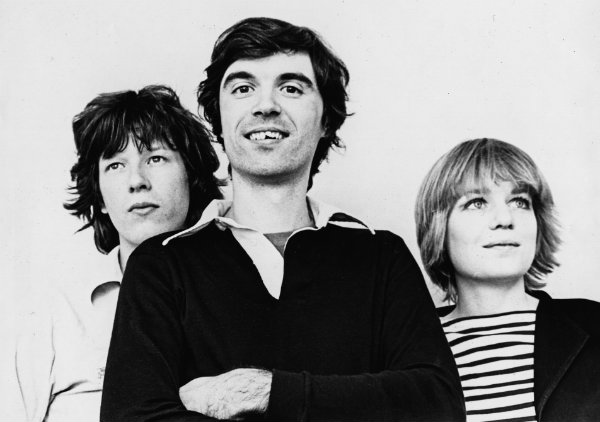
Chris Frantz, David Byrne and Tina Weymouth | Courtesy St. Martin’s Press
Q: In the book, you describe you and Tina having difficulties with David, and that grew over the years. But you’re also very clear about the musical chemistry of the band. One of the line that really stuck with me was, “David was not anybody’s idea of a good singer, but he was our idea of a great vocalist.” To me, Talking Heads really was one of those bands that’s so much greater than the sum of the parts, and everything really clicked, even if the personalities didn’t always.
A: I completely agree. But, you know, actually, our personalities — we actually got along really well for a long time. In retrospect, I really wouldn’t change anything. Maybe the way David’s brain was wired. I would change that. But artistically speaking, it really went along very well for a long time, and I think would continue to do so. But, unfortunately, that’s not going to happen, it seems.
Q: You do describe these great collaborations and recording sessions. But even with Brian Eno, who you were so excited to first meet, by the time you got to ‘Remain in Light,’ that wasn’t working out so well anymore — even though the results were great.
A: Yes, well, Brian just became more and more demanding. I think you probably read in the book that I spoke to the manager of U2, Paul McGuiness, an excellent manager who we had known since U2 toured with Talking Heads as our opening band in the late ’70s and early ’80s. Paul was a very hands-on manager and I ran into him in New York City, I think it was a Kirsty MacColl concert at Tramps, and said, “How’s the new record coming?” He said, “Ugh, we’re having problems with Eno.” And he basically listed a list of grievances which were exactly the same problems we had with Brian, where he was just never satisfied with what he was getting. He’s always wanted more. Let me just say that he’s probably the best producer I’ve ever worked with, at least when it comes to ideas. He has a lot of ideas, and many are great ideas. But when it came down to the business end of things, he just got too demanding to the point where we had to say, “Sorry, Brian, we’ve had a good run, but this is it.”
Q: One of the things I noticed was early on you talk about your discovery of Fela Kuti and Africa 70. It seems like you can draw a line from that to “I Zimbra” to ‘Remain in Light’ to the big band tours. You must have really admired Tony Allen, who just passed away. What did you learn from listening to him?
A: Well, you know, when I listened to those Fela records, I was never really sure how many drums were really there, and how many tracks were one drummer and how many tracks were another. I never got to meet Tony Allen, unfortunately. I came really once one time in London. But I’ve since watched YouTube videos of him playing and I learned a lot more from those than actually listening to the records. I love the records and I love the grooves and everything. What I learned from listening to those records was the way the drums would accent different parts differently than the way rock ‘n’ roll drummers would accent their parts. Everything seemed to be in fact more fluid with Fela. The percussion parts were something that was flowing like a tide, ebbing and rising and falling. There’s a lot of musical breathing room going on in those parts, as opposed to, say, Charlie Watts and the Rolling Stones.
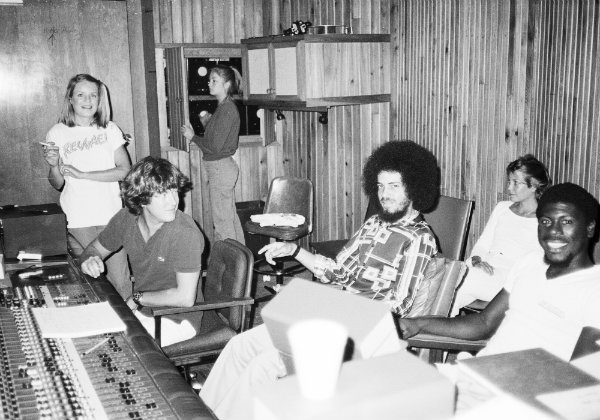
Tom Tom Club in the studio | Courtesy St. Martin’s Press
Q: How important was it to you and Tina to have the creative outlet of Tom Tom Club — and not just creative, but the fact that it was so successful?
A: We weren’t really looking for that at all. We saw Talking Heads as like our mothership. Tina sometimes described it as our first child. And you know, you always want to protect your first hcild, and you love your first child. That’s how we felt about Talking Heads. But then one day our manager said, “You know, David’s going to be doing a solo album and he doesn’t know how long it’s going to take and it could be a long time before the next Talking Heads record, so what do you all want to do?” I wasn’t going to make a solo record, and Tina wasn’t going to make a record — although Jerry said, “I’m going to make a solo record.” So they’re both making solo records and, you know, (Sire Records co-founder) Seymour Stein gave them solo deals. But Seymour wasn’t offering us a solo deal. So (manager) Gary (Kurfirst) went to them and said, “Seymour, how much can you give to Chris and Tina to make a solo record?” And he said, “Oh, I can’t afford three Talking Heads solo projects.” So Gary being a smart guy went to our friend Chris Blackwell, who was the president of Island Records, who we knew from working down in Compass Point (Studios in the Bahamas), and he’d come to see us at CBGB’s. In the early days of Talking Heads, he came down with Robert Palmer and Andy Warhol to see us play, so we had history with Chris Blackwell even though we’d never worked together. So Chris said to Gary, “Well, I understand the value of a good rhythm section. Why don’t you have Chris and Tina come here to Nassau, to Compass Point, and record a single. And if I like the single, then they can do a whole album.” So we jumped at that opportunity. For those sessions we had a meeting with Lee (“Scratch”) Perry, and Lee Perry was supposed to produce us, but he never showed up. It turned out later it was due to some imagined dispute that he had with Chris Blackwell. So we worked with a young Jamaican guy who was only 19 at the time, Steven Stanley. He was one of the house engineers at Compass Point. He had recorded the basic tracks for “Once in a Lifetime,” so we knew he was very capable and we liked him a lot. He was our neighbor down there. So we said to Chris Blackwell, “Well, how about we just do it with Stevie since we’ve been waiting for Scratch for two weeks and he’s not here?” Blackwell said, “Great idea. Go for it.” So we recorded this song called “Wordy Rappinghood” and we invited Chris Blackwell to listen to it and see if he liked it and he did — in fact he loved it and said, “I want to release this as a single right now in time for summer. But in the meantime you can record a whole album.” So that’s how the Tom Tom Club came about. It was like magic. We never had any intention of doing anything separate from Talking Heads, but when we had to do that, our hand was kind of forced, we decided to do something that sounded completely different that nobody would have any idea had anything to do with Talking Heads. Anyway, it was like magic. And the next thing we knew we were riding in a cab, Tina and David and I and our manager, riding in a big checkered cab heading downtown, and Gary, our manager, said, “Well, guess what? Tom Tom Club went gold today.” And you know, that was our first gold album. It was a wonderful success, and it kind of gave the whole Talking Heads band a recharge because “Genius of Love” was on the radio all the time — particularly what was called urban or Black or R&B radio, and then it eventually crossed over to white people also. Then suddenly I think David even got jealous. He was jealous of the fact that we had commercial success with it. I think he felt maybe a newfound respect for the abilities, the chemistry, that Tina and I brought to the band.
Q: “Genius of Love” is one of the highlights of “Stop Making Sense,” too.
A: Well, thank you.
Q: In the book — speaking of “Stop Making Sense” — after that you spend a lot less time on the remaining years, which I guess makes some sense since the band was winding down and you weren’t touring anymore. But I do wonder how you feel about those last few albums. I was always pretty fond of ‘True Stories’ and I absolutely love ‘Naked,’ which I think is a really underrated record.
A: Yes, I feel the same way about Naked, and True Stories was fun. We had fun recording it. It went very quickly. That was really David’s baby, True Stories, and also Little Creatures. He was thinking about the movie he wanted to make, “True Stories,” so it sort of became “The David Byrne Show” for a while because the success of “Stop Making Sense” had really made him a star. His picture was on the cover of Time magazine, things like that. David had an opportunity and he wanted to make this movie, so he did it. Originally, with True Stories, he wanted the actors and actresses to be the vocalists. But Warner Bros., and also to a certain extent our band, said, “David, I’m not sure people are going to respond to that well” — with all due respect to John Goodman. David eventually did a separate version of True Stories with the actors singing and it sold about 10 copies or something. Anyway, we had fun recording it and, I love that song “Dream Operator,” I love “Puzzlin’ Evidence,” a lot of those songs, I think are really good songs. But we were all happy to get back to the Talking Heads way of doing things with Naked, which was pretty much put together in the same way that we did Remain in Light, by improvising in the studio and building the songs around those improvisations. It was great to be in Paris, a city that we really loved, and it was great to work with our friend Wally Badarou, who introduced us to the creme de la creme of African musicians, most of whom were living in Paris and working in Paris. We just had a ball. And then we came back to New York and added horn sections and things like that. And that’s where David did his final vocals. But the actual Paris sessions were really quite something.
Q: It would have been great to see that material live.
A: It would have been. And you can imagine we, other than David, were quite disappointed that we weren’t able to do that.
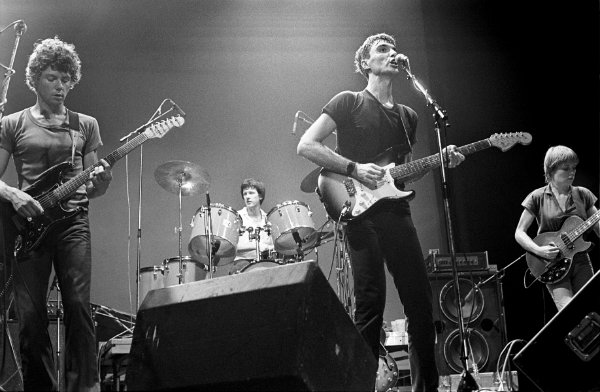
Talking Heads | Courtesy St. Martin’s Press
Q: Since the band split, you and Tina have remained active. I remember seeing the tour you two did with Jerry and Johnette Napolitano doing the old Talking Heads songs, and you’ve made more Tom Tom Club records, including one just a few years ago. Are you making new music? Are you playing drums a lot still?
A: I wouldn’t say I’m playing a lot, but I was playing the other day just to see how badly out of shape I’ve become.
Q: What was the verdict?
A: I need a little more practice before I get in front of the public. It’s kind of like riding a bicycle. Once you get back on it, you just have to go a little ways and you’re back where you were. We’re not really active, we’re not touring, we’re not making any new records. I’ve just been working on this book and enjoying my family life. And, you know, we’re of a certain age now. I’m 69, and not that that’s real, real old, but we’re getting up there and fortunately we had a few good years and planned things out pretty well, I think. So even though nobody’s touring right now, we’re not exactly hurting, so it’s a good time to stop and enjoy the fruits of our labor. I think we’ll probably at some point do another musical project and I think when we do it, it might be an electronic thing where it’s just Tina and myself, keeping the overhead way down, and doing something that has kind of an underground flavor to it. I don’t think we’ll be looking for any record deals or anything, we’ll just release it ourselves. I don’t know when it’s coming. We’ve done a couple things, we have a couple things in the can that sound really promising. They’re not rock ‘n’ roll at all, or even funk. They’re more in the spirit of Kraftwerk.
Q: I look forward to hearing that.
A: I think it’ll come out one day.
Chris Frantz’s memor “Remain in Love” will be published July 21 by St. Martin’s Press.
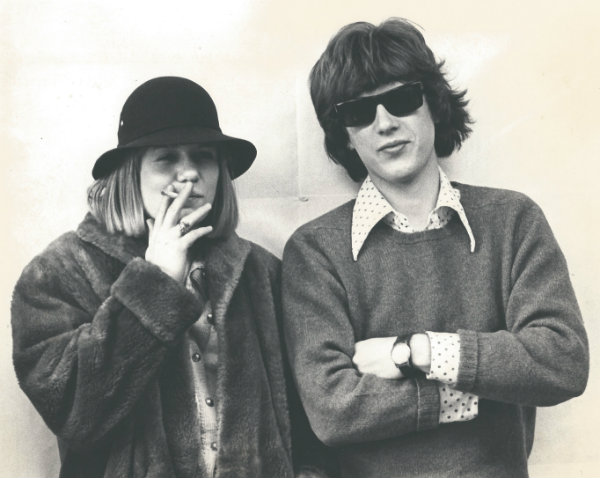
Tina Weymouth and Chris Frantz | Courtesy St. Martin’s Press
PREVIOUSLY ON SLICING UP EYEBALLS
- Talking Heads drummer Chris Frantz’s memoir ‘Remain in Love’ to be published in 2020
- Watch: Tina Weymouth, Chris Frantz talk Talking Heads, Tom Tom Club in 2½-hour Tokyo lecture
- Stream: Tom Tom Club, ‘Downtown Rockers’ EP — first new release in 12 years
- Talking Heads ‘Chronology’ DVD to feature live performances from 1975-1983, 2002
- Hear a newly unearthed Talking Heads song from 1976: ‘We call it Theme’

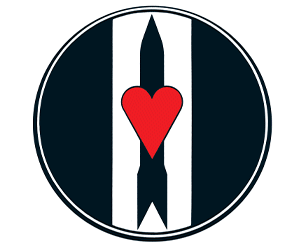
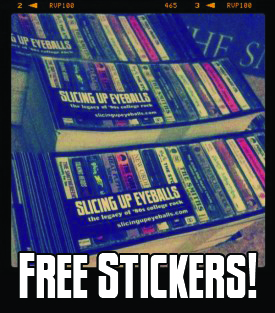










Great Interview!! I Just wonder when there will be an update of Talking Heads remastered albums since the box released too many years ago is out of print for decades!!
Rhino did the first 4 albums – 77 through Remain in Light, but has never got round to releasing Little Creatures, True Stories, and Naked.
Excellent interview, and I agree, “Naked” is one of the most underrated albums out there. “Blind” and “(Nothing But) Flowers”… some of my favorite TH songs.
I did get to see Byrne’s recent “American Utopia” tour, which was its own bit of genius. It really is too bad Talking Heads didn’t last longer, but they were as unique a sound as we are ever likely to hear in rock.
I agree that “Naked” is very underrated, but it says a lot about what a great band The Heads were that it still ranks near the bottom of their output. My ranking of their studio albums:
1. Remain in Light
2. Speaking In Tongues
3. Talking Heads: 77
4. More Songs About Buildings And Food
5. Fear Of Music
6. Little Creatures
7. Naked
8. True Stories
I never got to see them live. Sadly, it looks that I never will.
My ranking, slightly different from your:
1. Remain in Light
2. Fear Of Music
3. Speaking In tongues
4. More Songs About Buildings And Food
5. Little Creatures
6. Talking heads:77
7. True Stories
8. Naked
A few years ago I made a CD with a different track listing for Naked. There’s just some tracks off of that release that leave me cold and un-engaged. My version of Naked:
Totally Nude
(Nothing But) Flowers
Ruby Dear
Sax and Violins
Blind
Mommy Daddy You and I
Lifetime Piling Up
Mr. Jones
Lifetime Piling Up
Bill
OK, couple of typos, and it appears I can’t edit.
Track listing should read:
Totally Nude
(Nothing But) Flowers
Ruby Dear
Sax and Violins
Blind
Mommy Daddy You and I
Lifetime Piling Up
Mr. Jones
Big Daddy
Bill
great interview! am i the only one who could hear Frantz’ voice as i was reading his answers? it was like he was speaking in the room.
More on Chris Frantz and his book:
https://www.theguardian.com/music/2020/jul/21/chris-frantz-talking-heads-david-byrne?utm_source=pocket-newtab
So I picked this up yesterday and started reading it. When it comes to drumming, Chris Frantz is a master.
When it comes to writing, Chris Franz is a drummer.
There are some engaging anecdotes, but the writing is stilted, pedantic and lacks the personality of even the interview above. Having read John Doe’s “Under the Big Black Sun” (which is a righteous piece of art unto itself), I guess I was expecting more. (Maybe Chris needed his version of Tom DeSavia, to collaborate with.)